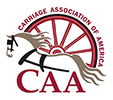
A. T. Demarest & Co.
New York
Circa 1905
Type:
The word “trap” was adapted from the English usage as a generic term for a small pleasure carriage, but in the 1880s, some American carriage builders used the term with a more specialized meaning, for a type of phaeton with two seats. The rear seat was reversible, and when facing to the rear, the tail board could be let down to serve as a foot board. When facing forward, access to the rear seat was provided via the front, by having one or both of the front seats made to swing forward or tip to one side. The occupants of the rear seat were then truly in a trap, being unable to get out until the front passengers had left their seats. These small pleasure carriages became something of a specialty of the carriage makers of Amesbury, Massachusetts.
Provenance:
The hunting trap was bought in June, 1961, from Mr. Ward Melville, the founder of The Museums at Stony Brook on Long Island. It has suffered serious damage on more than one occasion when used in driving competitions. The body is rather high in relation to its width and, being mounted on four elliptic springs which can have a pronounced rebound action, it is prone to being thrown over when driven at a fast pace over rough ground. It was most recently repaired and refurbished by Abner Lapp of Intercourse, Pennsylvania, in 1979.
Builder:
Aaron T. Demarest was born in Nyack in the Hudson Valley in 1841. He learned the trade of carriage building and started his own business in New York City in 1860. A little later, Gabriel C. Chevalier became his partner, and the firm was then styled A.T. Demarest & Co. Some time later, the firm had a showroom at 636 Broadway. The firm of A.T. & C.B. Demarest took over the New Haven carriage works of Lawrence, Bradley & Pardee in New Haven, Connecticut, in 1877, and sold carriages from the Demarest showrooms in New York City. In 1889, the firm moved to new premises at 335 Fifth Avenue under the name of A.T. Demarest & Co. They remained in business until about 1911.
